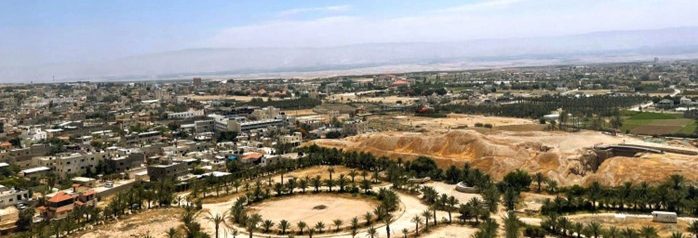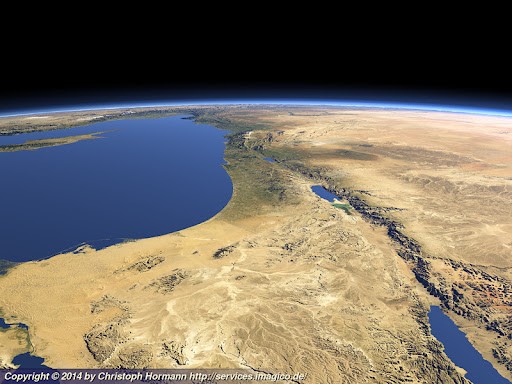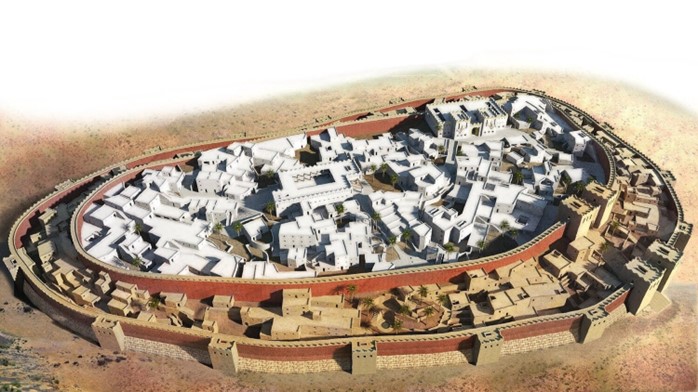
A-Z of Places Jesus Visited
‘These things were done in Bethabara beyond Jordan, where John was baptizing.
John 1v28

Satellite photograph of the Arabah
Although the word ‘Arabah’ is only mentioned in one verse of the Bible in the book of Joshua,1 it is mentioned over 50 times in the Old Testament, often translated as either ‘the plain’ or ‘the plains of Moab’. The Arabah consists of a long deep valley stretching around 250 miles, from north to south, and varying from around 3 to 12 miles in width from east to west.2 The upper half of the valley consists of the Jordan River flowing out of the Sea of Galilee and down into the Dead Sea. The lower half of the valley is one of the driest places on earth with a rainfall of less than 50mm per year. Consequently, it is a barren wilderness surrounded by often spectacular mountains and cliffs rising up to the land of Jordan on the east and Israel to the West. The valley is part of a much larger geological formation which extends over 3500 miles down into East Africa.
The centre of the valley, where the Dead Sea is located is the lowest place on earth, at around 1400 feet below sea level. The Dead Sea is so called because of the high salt levels making life untenable. This is caused by water only flowing in to the Dead Sea through the river Jordan with no outlet and the loss of water is caused through evaporation. Around 10 miles from the north shore of the Dead Sea is the town of Jericho, called the ‘city of palm trees’ in the Bible,3 is fed by springs flowing down from the Judean mountains to the west. Jericho is considered the oldest city in the world4 and the city features in the Exodus story which occurred around 3500 years ago.5
It is to this city the Lord Jesus came as described in the gospel of Luke chapters 18 and 19. ‘The lowest place on earth’ may have been a view that others had of this town when we look at some of its inhabitants. In Luke chapter 18 verses 35 to 43 we read of a man called Bartimaeus who was brought low because of the circumstances he found himself in. Unlike people with disability who, to some degree, are provided for in most societies today, this blind man was reduced to sitting by the side of the road begging, covered with a dusty cloak probably to keep the sun off. He had heard from the crowds that the Lord Jesus had come to town and was passing nearby. Not being able to see, and not really being too concerned about causing a scene, he began to cry out, ‘Jesus, thou Son of David, have mercy on me’. These words demonstrated some insight from Bartimaeus showing he understood that the Lord Jesus was no less than the long-promised Messiah who God had revealed to David would come from his family.6
Did the Lord Jesus have time for someone like Bartimaeus? Most people probably ignored his request for help and walked on by. But Mark’s gospel tells us ‘and Jesus stood still’.7 These are monumental words when we consider that the Creator of the world stopped to help out a blind beggar. Also, the Lord Jesus was on the final phase of His life’s great mission to go to the cross in Jerusalem. The Lord Jesus asked what Bartimaeus wanted Him to do for him. But isn’t the answer obvious? ‘Lord, that I may receive my sight’8 he replied. The Lord Jesus knew exactly what he wanted but He wanted to hear it from Bartimaeus himself. The conclusion of the story is found at the end of Luke chapter 18, ‘and Jesus said unto him, receive thy sight: thy faith hath saved thee. And immediately he received his sight, and followed him, glorifying God: and all the people, when they saw it, gave praise unto God’.9
If Bartimaeus was a man brought low by circumstances outside of his control, later on in the account given by Luke we read of a man brought low through his life choices. Zacchaeus was a wealthy man, but his money had been acquired through ill-gotten gains. Luke tells us, ‘he was the chief among the tax collectors’. Not only was he a collaborator with the occupying power, the Romans to whom taxes were paid, but historical research tells us that tax collectors were able to enforce the collection of taxes often through military help. They also took a large slice of the money collected, either legally or illegally; their wages for taking on this extremely unpopular job. Tax collectors were hated and considered one of the lowest social group morally. They were grouped together with sex workers as those who had adulterated themselves to gain an income.
Like Bartimaeus this man too had heard the Lord Jesus has come to town. A crowd had gathered around the Lord Jesus and being short he climbed a sycamore tree nearby to see the Lord Jesus more clearly. Would the Lord Jesus have time for a person like Zacchaeus. Who would expect Him to? Not even Zacchaeus himself expected such as a thing. In Luke chapter 19 verse 5 we read ‘and when Jesus came to the place, he looked up, and saw him, and said unto him, Zacchaeus, make haste, and come down; for today I must abide at thy house’. The crowd began to murmur. Did the Lord Jesus really know what kind of person this was? The Lord Jesus gave His answer and the purpose of His wider mission, ‘and Jesus said unto him, This day is salvation come to this house, forsomuch as he also is a son of Abraham. For the Son of man is come to seek and to save that which was lost’.
Our departure from following God, something the bible calls sin, although being a consequence of our voluntary actions, has left us in circumstances beyond our control. Like both Bartimaeus and Zacchaeus sin brings us low. It degrades us morally and we find ourselves lost. Sin is something we need saving from. The experience of Bartimaeus and Zacchaeus can be our experience too. The Lord Jesus lifted both of these individuals up, when everyone else had given up on them.

Artist representation of Jericho
Artist representation of Jericho
2 Today the Arabah refers to the region south of the Dead Sea basing stretching down to the Gulf of Aqaba branch of the Red Sea. It is clear from Old Testament references that the term was more expansive in Bible times.
3 Deuteronomy 34 v3
4 The current population of Jericho is just over 20, 000 people and so would be reckoned as a small town today rather than a city
5 See Joshua chapters 2 and 6
6 2 Samuel chapter 7
7 Mark 10 v49
8 Luke 18 v41
9 Luke 18 v42-43